Summation
of the Joint Work of the Commissions
of the Russian Orthodox Church Outside of Russia
and the Moscow Patriarchate
Concluding the eighth
joint meeting of the Commissions and summarizing its work, it is worth noting
the path traveled, beginning with the meeting between His Holiness Patriarch
Alexy II of Moscow and All Russia and His Eminence Metropolitan Laurus, First
Hierarch of the Russian Orthodox Church Outside of Russia, in Moscow in May
2004. It was then that the Commissions were charged with preparing the documents
needed to reestablish canonical communion between the Moscow Patriarchate and
the Church Abroad.
The path towards
dialog was opened by fundamental changes in the life of the Orthodox Church
in Russia: ruined churches and monasteries are being rebuilt, parish life and
spiritual education are returning to normal, more and more people are coming
to the Orthodox faith. Orthodox Christians in Russia and abroad are children
of one Mother Church, heirs of a great spiritual tradition, cognizant of the
artificiality of continuing division. Meetings among clergymen and laypersons,
joint conferences, contact on the diocesan and parish level have helped destroy
old stereotypes and prejudices, steering mutual relations onto a constructive
track and preparing the groundwork for dialog on the hierarchical level.
The Council of Bishops
of the Russian Orthodox Church of 2000, which glorified the host of New Martyrs
of Russia and adopted a series of other important positions of principle, was
an event that laid the foundation for the irreversible movement towards unity.
The Acts of that Council evoked a positive response from the Council of Bishops
of the Russian Church Abroad held the following October. A series of practical
measures were subsequently taken towards rapprochement.
Finally, in the bright
Paschal days of 2004, at the invitation of His Holiness Patriarch Alexy II of
Moscow and All Russia, a delegation of the Russian Orthodox Church Outside of
Russia headed by His Eminence Metropolitan Laurus visited Russia.
After a common prayer
over the relics of the holy martyrs on the plain of Butovo, where tens of thousands
of Orthodox Christians gave their lives for Christ, it became apparent that
the time had come “to overcome the tragic division of our people,
which arose as a result of the revolution and civil war, and the desire to achieve
the reestablishment of Eucharistic communion and canonical unity within one
Local Russian Orthodox Church, an indissoluble part of which the Russian Church
Abroad always sensed itself. Our goal,” states the document adopted
during Metropolitan Laurus' visit, “is to draw nearer that day when
with one mouth and one heart we might glorify God.”
For the sake of eliminating
obstacles to full church communion, His Holiness Patriarch Alexy and His Eminence
Metropolitan Laurus called upon the flock to pray fervently for the blessed
success of the path taken. The negotiating Commissions established by decisions
of the Holy Synod of the Russian Orthodox Church and the Synod of Bishops of
the Russian Orthodox Church Outside of Russia were given instructions to “develop
a common understanding on the following matters, based on the historical experience
of the Russian Church and the problems facing the Church today:
“The principles
of the relationship between the Church and state in accordance with the teachings
of the Church;
“The principles of the relationship between the Orthodox Church and heterodox
communities and inter-confessional organizations in accordance with Church traditions;
“The status of the Russian Orthodox Church Outside of Russia as a self-governing
part of the Russian Orthodox Church;
“The canonical conditions for the establishment of Eucharistic communion.”
Over the course of eight joint meetings of the Commissions, held in Moscow,
Munich, Paris, New York and Cologne since June 2004 through October 2006, a
series of documents were prepared expressing a common understanding of these
matters of principle. All of these documents have now been approved by the Hierarchies
of the Moscow Patriarchate and the Russian Orthodox Church Outside of Russia.
The document “On
the Relationship Between the Church and State,” declares: “The
Church is called upon to exert spiritual influence on the state and its citizens,
to confess Christ, to defend the moral foundations of society. By interacting
with the state for the good of the people, the Church, however, cannot assume
civil functions for itself. The state must not interfere in the inner structure,
administration or life of the Church. The Church must support all good initiatives
of the state, but must resist evil, immorality and harmful social phenomena
and always firmly confess the Truth, and when persecutions commence, to continue
to openly witness the faith and be prepared to follow the path of confessors
and martyrs for Christ.”
These principles,
upon which the Russian Church establishes its relationship with the state, were
actually adopted earlier, at the Council of Bishops of the Russian Orthodox
Church in 2000, the Council that glorified the New Martyrs of Russia. This Council
of Bishops declared: “The Church remains loyal to the state, but God's
commandment to fulfill the task of salvation in any situation and under any
circumstances is above this loyalty... If the authority forces Orthodox believers
to apostatize from Christ and His Church and to commit sinful and spiritually
harmful actions, the Church should refuse to obey the state.”
The “Commentary”
to the document “On the Relationship Between Church and State” was
devoted to reaching an understanding of events in the history of the Church
in the 20th century in light of this concept.
The Commissions studied
the viewpoints of the relationships of the Orthodox Church to other confessions
that had developed in the Moscow Patriarchate and in the Church Abroad. Despite
variations stemming from different circumstances in church life, both sides
unanimously declared:
“The Russian
Orthodox Church strictly adheres to the teaching set forth in the Creed that
the Church of Christ is one...
“A condition
of the Orthodox Church’s participation in inter-confessional organizations,
including the World Council of Churches, is the rejection of religious syncretism.
Orthodox Christians insist on their right to freely confess their faith in the
Orthodox Church as the One Holy Universal and Apostolic Church without conceding
the so-called ‘branch theory’ and definitively reject any attempts
to dilute Orthodox ecclesiology.
“The Orthodox
Church excludes any possibility of liturgical communion with the non-Orthodox.
In particular, it is considered impermissible for Orthodox to participate in
liturgical actions connected with so-called ecumenical or inter-confessional
religious services... In general, the Church should determine the forms of interaction
with the heterodox on a conciliar basis, stemming from its teachings, canonical
discipline and ecclesiastical expediency” (“On the Attitude
of the Orthodox Church Towards the Heterodox and Towards Inter-Confessional
Organizations”).
With regard to actual
manifestations of such relations, the document states the following: “[T]he
possibility of cooperation with the heterodox is not excluded, for example,
in helping the unfortunate and by defending the innocent, in joint resistance
to immorality, and in participating in charitable and educational projects.
It may be appropriate to participate in socially meaningful ceremonies in which
other confessions are represented. In addition, dialog with the non-Orthodox
remains necessary to witness Orthodoxy to them, to overcome prejudices and to
disprove false opinions. Yet it is not proper to smooth over or obscure the
actual differences between Orthodoxy and other confessions.”
Within such limits
in the relationship with the heterodox, it is clear that the participation of
the Russian Orthodox Church in the World Council of Churches does not have ecclesiological
significance. The Moscow Patriarchate views this organization as nothing more
than a forum, since the Church as the Body of Christ by her very nature cannot
be a part of a heterodox organism. This position is unequivocally expressed
by the Council of Bishops of the Russian Orthodox Church of 2000 in the “Basic
Principles of the Russian Orthodox Church's Attitude to the Non-Orthodox.”
The most important
of all the documents drafted by the Commissions was the “Act
of Canonical Communion”, which was considered
by the Council of Bishops of the Russian Orthodox Church, the IV All-Diaspora
Council and Council of Bishops of the Russian Orthodox Church Outside of Russia,
and finally approved by the Holy Synod of the Moscow Patriarchate and the Synod
of Bishops of the Russian Orthodox Church Outside of Russia.
The “Act on
Canonical Communion” recognizes the independence of the Russian Orthodox
Church Outside of Russia in pastoral, educational, administrative, management,
property and civil matters. Its Council of Bishops is preserved; moreover, her
bishops, clerygmen and laity become full-fledged participants in the Local Council
[Pomestny Sobor] of the Russian Orthodox Church; and her bishops also participate
in her Council of Bishops and Holy Synod in the established order. Decisions
of the Local Council and Council of Bishops of the Russian Orthodox Church and
the Holy Synod extend to the Russian Church Abroad, yet with consideration of
her Regulations [Polozheniye] and of her circumstances in the diaspora.
The Holy Synod of
the Russian Orthodox Church and the Synod of Bishops of the Russian Orthodox
Church Outside of Russia accepted proposals of the Commissions on the status
of clergymen who had gone from one jurisdiction to another and were under canonical
suspension, and also on parishes of the Church Abroad on the canonical territory
of the Moscow Patriarchate. The hierarchies of both sides affirmed that these
problems must be resolved on the basis of Holy Canons and in the spirit of love
and oikonomia.
Where necessary,
in the parishes of the Russian Church Abroad, in that same spirit of oikonomia
and at the discretion of the local ruling bishop, a five-year transitional period
may be established with special liturgical commemoration.
The Hierarchies of
both sides approved the proposal of the Commissions to convene—following
the adoption of the “Act of Canonical Communion”—a conference
of the archpastors of the Russian Orthodox Church in the countries of the diaspora,
and confirmed a list of those topics which should be discussed.
As we approach the
end of the present stage of our work, the members of the Commissions recognize
that over the years of division, more than a few questions have accumulated
which require understanding and resolution. These include interrelationships
in diocesan and parish life abroad; Orthodox mission; specifics in relationships
with other faiths; agreement on the celebration of newly-glorified saints; martyrologies,
and clarifying the titles of diocesan bishops. These and other ecclesio-canonical
and pastoral problems, and also the challenges which our difficult times will
continue to set before the Church, must be decided within a new phase in the
life of the Russian Church - with conciliar discussion. The hope for this was
expressed by the members of the IV All-Diaspora Council: “We hope
that the forthcoming Local Council of One Russian Church will settle remaining
unresolved church problems.”
Cooperation between
the Moscow Patriarchate and the Russian Orthodox Church Outside of Russia during
the period of the Commissions' work was not limited to the preparation of joint
documents. Reciprocal visits by hierarchs, clergymen and laypersons enhanced
better understanding and the development of fraternal relations. The holy relics
of Holy Grand Duchess Elizaveta Feodorovna and Nun Varvara from Gethsemane Convent
of the Russian Church Abroad in the Holy Land were brought to the territory
of the Moscow Patriarchate, and over a million worshipers venerated them.
The German Diocese
of the Russian Church Abroad and the Stavropol Diocese of the Moscow Patriarchate
are together building a rehabilitation center for the people of Beslan who suffered
from terrorism.
The theological schools
of the Moscow Patriarchate and the Russian Orthodox Church Outside of Russia
have begun a student-exchange program.
Representatives of
the Moscow Patriarchate and the Russian Church Abroad jointly participated in
the return to Russia of the remains of Empress Maria Feodorovna, General A.I.
Denikin and the philosopher I. A. Ilyin.
The unfolding of
dialog drew a great deal of attention both in Russia and abroad. The Patriarchates
of Jerusalem, Serbia and Bulgaria, the Holy Kinot of Mount Athos, archpastors
of Local Churches, monastics, social and civil leaders have all sent letters
and appeals to the hierarchy of the Russian Orthodox Church Outside of Russia
expressing hope for the expedient conclusion of the process of regaining unity.
The efforts of the
Commissions were accompanied by the prayers of Orthodox Christians in Russia
and abroad who see in the desired unity the fulfillment of the will of God.
Through the prayers of our New Martyrs of Russia and of the entire nation, may
this, God's will, be done.
Presidents
of the Commissions:
+
Innokenty, Archbishop of Korsun +
Mark, Archbishop of Berlin and Germany
The feast day
of the Iveron Icon of the Mother of God
Cologne, October
13/26, 2006
www.mospat.ru
www.russianorthodoxchurch.ws
The Act of Canonical Communion is Signed and the First Joint Celebration of Divine Liturgy by the Primates of the Two Parts of the Russian Orthodox Church Takes Place in Christ the Savior Cathedral
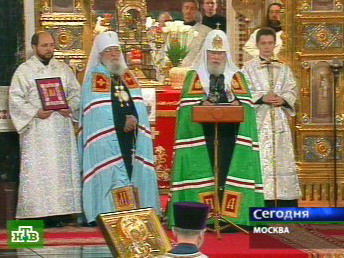 On May 17, 2007, the day of the Ascension of the Lord, the Act of Canonical Communion between the Russian Orthodox Church Outside of Russia and the Moscow Patriarchate was signed. The ceremony of the reestablishment of the fullness of communion within one Local Russian Orthodox Church was attended by President Vladimir Putin of the Russian Federation, along with other government officials.
On May 17, 2007, the day of the Ascension of the Lord, the Act of Canonical Communion between the Russian Orthodox Church Outside of Russia and the Moscow Patriarchate was signed. The ceremony of the reestablishment of the fullness of communion within one Local Russian Orthodox Church was attended by President Vladimir Putin of the Russian Federation, along with other government officials.
From early morning, a multitude of Orthodox Christians of Moscow and pilgrims of the Russian Orthodox Church Outside of Russia began streaming to the church.
uring the proskomedia, the First Hierarch of the Church Abroad arrived. His Eminence was greeted by the Secretary of the Commission of the Russian Orthodox Church Outside of Russia on talks with the Moscow Patriarchate, Protopriest Alexander Lebedeff, and the Secretary of the Commission of the Moscow Patriarchate on talks with the Church Abroad, Protopriest Nikolai Balashov. Clergymen of the Moscow Patriarchate emerged from one of the side altar doors to greet His Eminence, and an equal number of clergymen of the Russian Orthodox Church Outside of Russia from the other side. Venerating the altar-table cross, His Eminence Metropolitan Laurus blessed the clerics and worshipers with it, and then entered the altar.
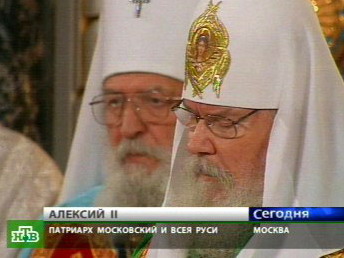 Greeting His Holiness Patriarch Alexy II of Moscow and All Russia were the archpastors of the Russian Orthodox Church Outside of Russia and members of the Holy Synod of the Moscow Patriarchate, plus Archbishop Innokenty of Korsun and Archbishop Evgeny of Verey, members of the Moscow Patriarchate's Commission, who all emerged together through the Royal Doors wearing white vestments.
Greeting His Holiness Patriarch Alexy II of Moscow and All Russia were the archpastors of the Russian Orthodox Church Outside of Russia and members of the Holy Synod of the Moscow Patriarchate, plus Archbishop Innokenty of Korsun and Archbishop Evgeny of Verey, members of the Moscow Patriarchate's Commission, who all emerged together through the Royal Doors wearing white vestments.
As the bells of Christ the Savior Cathedral pealed overhead, His Holiness was greeted by the Dean of the Central Deanery of Moscow, Protopriest Vladimir Divakov, and Senior Priest of Christ the Savior Cathedral, Protopriest Mikhail Ryazantsev.
Donning the mantle, His Holiness blessed the bishops and clergymen with the cross, after which he ascended the cathedra in the middle of the church. As His Holiness Patriarch Alexy II entered the church, His Eminence Metropolitan Laurus of Eastern America and New York proceeded to the cathedra. Standing on the north and south sides were the bishops and clergymen of the Russian Orthodox Church Outside of Russia and the Moscow Patriarchate.
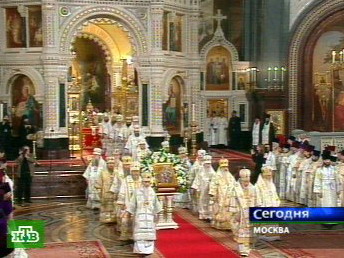 After the troparions, sung in turn by the unified choir of the Russian Orthodox Church Outside of Russia and by Holy Trinity-St Sergius Lavra Choir, His Holiness Patriarch Alexy II of Moscow and All Russia read a special prayer which included the words: “As Thee lifted Thy prayers to Thy Heavenly Father for Thy disciples, that they all be as one, gaze now with Thy merciful eyes upon Thy people, who have sinned and disobeyed Thy will, bless now our good intention and the unification of the Church to Your Glory, create this Thyself, dampen all church temptations and divisions. Having given to us Thy law to love Thee, our God, and our neighbor, deliver us from all insult and disruption, may brotherly love reign among the children of our Church, in the Fatherland and in the diaspora. Grant that we may now enter Thy temple and bring Thy bloodless sacrifice, that we may be unified in one body through communion with Thy Life-creating Body and Thy Honorable Blood and bring praise with all our hearts to Thy ineffable love for mankind.”
After the troparions, sung in turn by the unified choir of the Russian Orthodox Church Outside of Russia and by Holy Trinity-St Sergius Lavra Choir, His Holiness Patriarch Alexy II of Moscow and All Russia read a special prayer which included the words: “As Thee lifted Thy prayers to Thy Heavenly Father for Thy disciples, that they all be as one, gaze now with Thy merciful eyes upon Thy people, who have sinned and disobeyed Thy will, bless now our good intention and the unification of the Church to Your Glory, create this Thyself, dampen all church temptations and divisions. Having given to us Thy law to love Thee, our God, and our neighbor, deliver us from all insult and disruption, may brotherly love reign among the children of our Church, in the Fatherland and in the diaspora. Grant that we may now enter Thy temple and bring Thy bloodless sacrifice, that we may be unified in one body through communion with Thy Life-creating Body and Thy Honorable Blood and bring praise with all our hearts to Thy ineffable love for mankind.”
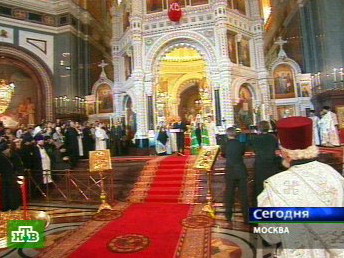 Then, the Secretaries of both Church Commissions, Mitred Protopriest Alexander Lebedeff and Protopriest Nikolai Balashov read the texts of the decrees of the Holy Synod of the Moscow Patriarchate and of the Synod of Bishops of the Russian Orthodox Church Outside of Russia on the confirmation of the Act of Canonical Communion. The text of the Act itself was read from the ambo by Protodeacon Vladimir Nazarkin.
Then, the Secretaries of both Church Commissions, Mitred Protopriest Alexander Lebedeff and Protopriest Nikolai Balashov read the texts of the decrees of the Holy Synod of the Moscow Patriarchate and of the Synod of Bishops of the Russian Orthodox Church Outside of Russia on the confirmation of the Act of Canonical Communion. The text of the Act itself was read from the ambo by Protodeacon Vladimir Nazarkin.
he Act was then signed on the ambo of Christ the Savior Cathedral. His Holiness Patriarch Alexy II of Moscow and All Russia and His Eminence Metropolitan Laurus of Eastern America and New York put their signatures under this historic document. Then, with the words “Christ is among us! Now and forever,” they kissed each other three times.
Archdeacon Andrei Mazur intoned Many Years to Patriarch Alexy and the Holy Synod of the Moscow Patriarchate, to His Eminence Metropolitan Laurus, First Hierarch of the Russian Orthodox Church Outside of Russia and its Synod of Bishops.
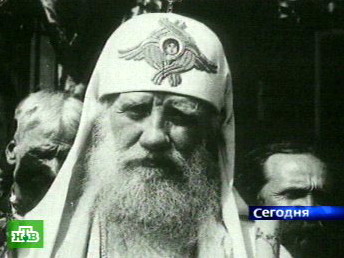 Another Many Years was intoned by Archdeacon Eugene Burbelo of the Russian Orthodox Church Outside of Russia: “To the God-preserved nation of Russia and her children in the Fatherland and in the diaspora, and to all Orthodox Christians—Many Years!”
Another Many Years was intoned by Archdeacon Eugene Burbelo of the Russian Orthodox Church Outside of Russia: “To the God-preserved nation of Russia and her children in the Fatherland and in the diaspora, and to all Orthodox Christians—Many Years!”
Then Patriarch Alexy and Metropolitan Laurus exchanged greetings:
“Joy fills our hearts,” said His Holiness, “An historic event has taken place, which we have awaited for many years. The unity of the Church is restored. This ceremony is precious for the Church, as she gathers her children together, it is precious for our entire people. Church division is being overcome, overcome also is the conflict within society inherited from the days of the revolution. The Church is being strengthened—our Fatherland, too, is being reborn.”
Then His Eminence Metropolitan Laurus spoke, saying in part:
“Your Holiness! Your Excellency! Eminent archpastors, beloved in the Lord fathers and children of the Russian Orthodox Church!
“The first word that Christ said to His followers after He rose from the dead was ‘Rejoice.' The second word that the Lord said to His disciples after the Resurrection was ‘peace be unto you.' And so, on this holiday, we hear these greetings from the Ascended Lord, who granted us the joy of unity and blessed us with His peace. I congratulate all of you with this great joy!
“First of all, I bring thanks to the great Chief Pastor, our Lord Jesus Christ, who gave us the strength to perform this great deed. On behalf of my fellow-travelers and on my own behalf, I personally express to Your Holiness and Your Excellency the profound gratitude that fills our hearts and souls for the loving invitation to visit you, for your brotherly benevolence and hospitality, and I raise my prayers to the Altar of the All-Highest, that He send His Omnipotent help and heavenly blessing to your zealous labors for the glory of the Holy Church of Christ and our Russian people.
“On this blessed day and in this blessed hour of our spiritual communion, I want to express the hope that the brotherly bonds between both parts of the Russian Orthodox Church would constructively develop and deepen our unity and joint service to God and the Russian people, in the Fatherland and in the diaspora. Amen.”
His Holiness then addressed the Chief of State of the Russian Federation, noting his participation in the work of reestablishing unity within the Local Russian Orthodox Church. His Holiness reminded everyone that a few years ago, Vladimir Vladimirovich Putin, during a visit to New York, met with His Eminence Metropolitan Laurus and the members of the Synod of Bishops of the Russian Orthodox Church Outside of Russia. “In you they saw a person dedicated to Russia, an Orthodox Christian who serves his people,” said the Primate of the Russian Orthodox Church.
In memory of this event, His Holiness gave the President a triptych representing the Life-Giving Trinity, the Vladimir Icon of the Mother of God and the Icon of the Host of New Martyrs and Confessors of Russia.
The Russian President then addressed those present. He said that the signing of the Act of Canonical Communion is an epochal event not only in the history of the Church but in the life of society in general. This event places an end to the division of the Church in the Fatherland and abroad.
After the signing of the Act of Canonical Communion, a solemn Divine Liturgy began, at the end of which His Holiness and His Eminence exchanged greetings.
After Liturgy followed the opening of an exhibition on the recent history of the Russian Orthodox Church, the New Martyrs and Confessors of Russia and the discussions on reconciliation that led to the restoration of brotherly communion and the unity of the Local Russian Orthodox Church. A trapeza then followed.
That evening, His Eminence Metropolitan Laurus met with the participants of the Church History Conferences held in 2001 and 2002, and others who helped in the great work of the unity of the Russian Orthodox Church.
More info: http://www.russianorthodoxchurch.ws/synod/enrt07/enakt.html
 On May 17, 2007, the day of the Ascension of the Lord, the Act of Canonical Communion between the Russian Orthodox Church Outside of Russia and the Moscow Patriarchate was signed. The ceremony of the reestablishment of the fullness of communion within one Local Russian Orthodox Church was attended by President Vladimir Putin of the Russian Federation, along with other government officials.
On May 17, 2007, the day of the Ascension of the Lord, the Act of Canonical Communion between the Russian Orthodox Church Outside of Russia and the Moscow Patriarchate was signed. The ceremony of the reestablishment of the fullness of communion within one Local Russian Orthodox Church was attended by President Vladimir Putin of the Russian Federation, along with other government officials.  Greeting His Holiness Patriarch Alexy II of Moscow and All Russia were the archpastors of the Russian Orthodox Church Outside of Russia and members of the Holy Synod of the Moscow Patriarchate, plus Archbishop Innokenty of Korsun and Archbishop Evgeny of Verey, members of the Moscow Patriarchate's Commission, who all emerged together through the Royal Doors wearing white vestments.
Greeting His Holiness Patriarch Alexy II of Moscow and All Russia were the archpastors of the Russian Orthodox Church Outside of Russia and members of the Holy Synod of the Moscow Patriarchate, plus Archbishop Innokenty of Korsun and Archbishop Evgeny of Verey, members of the Moscow Patriarchate's Commission, who all emerged together through the Royal Doors wearing white vestments.  After the troparions, sung in turn by the unified choir of the Russian Orthodox Church Outside of Russia and by Holy Trinity-St Sergius Lavra Choir, His Holiness Patriarch Alexy II of Moscow and All Russia read a special prayer which included the words: “As Thee lifted Thy prayers to Thy Heavenly Father for Thy disciples, that they all be as one, gaze now with Thy merciful eyes upon Thy people, who have sinned and disobeyed Thy will, bless now our good intention and the unification of the Church to Your Glory, create this Thyself, dampen all church temptations and divisions. Having given to us Thy law to love Thee, our God, and our neighbor, deliver us from all insult and disruption, may brotherly love reign among the children of our Church, in the Fatherland and in the diaspora. Grant that we may now enter Thy temple and bring Thy bloodless sacrifice, that we may be unified in one body through communion with Thy Life-creating Body and Thy Honorable Blood and bring praise with all our hearts to Thy ineffable love for mankind.”
After the troparions, sung in turn by the unified choir of the Russian Orthodox Church Outside of Russia and by Holy Trinity-St Sergius Lavra Choir, His Holiness Patriarch Alexy II of Moscow and All Russia read a special prayer which included the words: “As Thee lifted Thy prayers to Thy Heavenly Father for Thy disciples, that they all be as one, gaze now with Thy merciful eyes upon Thy people, who have sinned and disobeyed Thy will, bless now our good intention and the unification of the Church to Your Glory, create this Thyself, dampen all church temptations and divisions. Having given to us Thy law to love Thee, our God, and our neighbor, deliver us from all insult and disruption, may brotherly love reign among the children of our Church, in the Fatherland and in the diaspora. Grant that we may now enter Thy temple and bring Thy bloodless sacrifice, that we may be unified in one body through communion with Thy Life-creating Body and Thy Honorable Blood and bring praise with all our hearts to Thy ineffable love for mankind.”  Then, the Secretaries of both Church Commissions, Mitred Protopriest Alexander Lebedeff and Protopriest Nikolai Balashov read the texts of the decrees of the Holy Synod of the Moscow Patriarchate and of the Synod of Bishops of the Russian Orthodox Church Outside of Russia on the confirmation of the Act of Canonical Communion. The text of the Act itself was read from the ambo by Protodeacon Vladimir Nazarkin.
Then, the Secretaries of both Church Commissions, Mitred Protopriest Alexander Lebedeff and Protopriest Nikolai Balashov read the texts of the decrees of the Holy Synod of the Moscow Patriarchate and of the Synod of Bishops of the Russian Orthodox Church Outside of Russia on the confirmation of the Act of Canonical Communion. The text of the Act itself was read from the ambo by Protodeacon Vladimir Nazarkin.  Another Many Years was intoned by Archdeacon Eugene Burbelo of the Russian Orthodox Church Outside of Russia: “To the God-preserved nation of Russia and her children in the Fatherland and in the diaspora, and to all Orthodox Christians—Many Years!”
Another Many Years was intoned by Archdeacon Eugene Burbelo of the Russian Orthodox Church Outside of Russia: “To the God-preserved nation of Russia and her children in the Fatherland and in the diaspora, and to all Orthodox Christians—Many Years!”